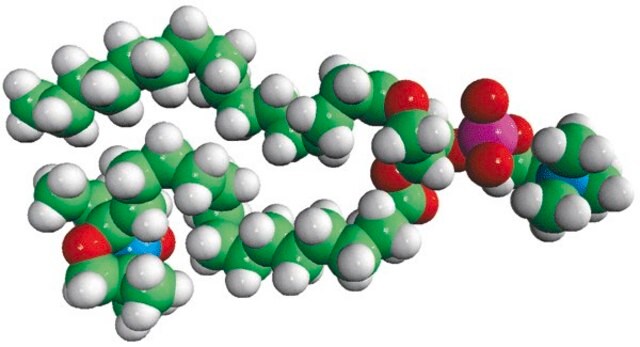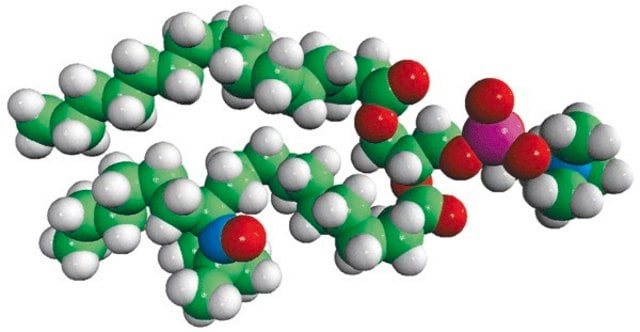810606P
Avanti
16:0 Tempo PC
Avanti Research™ - A Croda Brand 810606P, powder
Synonim(y):
1,2-dipalmitoyl-sn-glycero-3-phospho(tempo)choline
Zaloguj sięWyświetlanie cen organizacyjnych i kontraktowych
About This Item
Wzór empiryczny (zapis Hilla):
C48H94N2O9P
Numer CAS:
Masa cząsteczkowa:
874.24
Kod UNSPSC:
41141825
NACRES:
NA.25
Polecane produkty
Próba
>99% (TLC)
Postać
powder
opakowanie
pkg of 1 × 1 mg (810606P-1mg)
producent / nazwa handlowa
Avanti Research™ - A Croda Brand 810606P
typ lipidu
phospholipids
ESR probes
Warunki transportu
dry ice
temp. przechowywania
−20°C
Opis ogólny
1,2-dipalmitoyl-sn-glycero-3-phospho(tempo)choline (16:0 Tempo PC) is a spin label phospholipid, where TEMPO moiety is attached to phosphocholine headgroup.
Zastosowanie
1,2-dipalmitoyl-sn-glycero-3-phospho(tempo)choline (16:0 Tempo PC) may be used:
- as a spin-labeled quencher in liposomes to determine fluorophore depth
- as spin-labeled phospholipid along with 1,2-dimyristoyl(d54)-sn-glycero-3-phosphocholine-1,1,2,2-d4-N,N,N-trimethyl-d9 (DMPC-d67) to label lidocaine for paramagnetic relaxation measurements
- as a spin label to investigate the dependence of the packing and polarity of 1,2-dilauroyl-sn-glycero-3-phosphocholine (DLPC) bilayers with temperature or as quenchers of the Laurdan fluorescence to study the Laurdan position in fluid bilayers
Działania biochem./fizjol.
1,2-dipalmitoyl-sn-glycero-3-phospho(tempo)choline (16:0 Tempo PC/Tempo-PCSL) can effectively repress Laurdan fluorescence and can also quench the emission of long wavelength state.
Opakowanie
5 mL Clear Glass Sealed Ampule (810606P-1mg)
Informacje prawne
Avanti Research is a trademark of Avanti Polar Lipids, LLC
This page may contain text that has been machine translated.
Kod klasy składowania
11 - Combustible Solids
Klasa zagrożenia wodnego (WGK)
WGK 3
Temperatura zapłonu (°F)
No data available
Temperatura zapłonu (°C)
No data available
Certyfikaty analizy (CoA)
Poszukaj Certyfikaty analizy (CoA), wpisując numer partii/serii produktów. Numery serii i partii można znaleźć na etykiecie produktu po słowach „seria” lub „partia”.
Masz już ten produkt?
Dokumenty związane z niedawno zakupionymi produktami zostały zamieszczone w Bibliotece dokumentów.
Cíntia C De Vequi-Suplicy et al.
Journal of fluorescence, 16(3), 431-439 (2006-06-23)
Laurdan (2-dimethylamino-6-lauroylnaphthalene) is a hydrophobic fluorescent probe widely used in lipid systems. This probe was shown to be highly sensitive to lipid phases, and this sensitivity related to the probe microenvironment polarity and viscosity. In the present study, Laurdan was
Alexander Kyrychenko et al.
The Journal of membrane biology, 253(1), 73-77 (2019-09-22)
The characterization of the behavior of lipid-attached spin probes in a bilayer is of fundamental importance for correct interpretation of the results of both EPR and fluorescence studies of protein-membrane interactions. The knowledge of the immersion depth of TEMPO spin
Victor Vasquez-Montes et al.
Biochimica et biophysica acta. Proteins and proteomics, 1867(7-8), 691-700 (2019-04-21)
Bcl-xL is a member of the Bcl-2 family of apoptotic regulators, responsible for inhibiting the permeabilization of the mitochondrial outer membrane, and a promising anti-cancer target. Bcl-xL exists in the following conformations, each believed to play a role in the
Diego E Sastre et al.
The Journal of biological chemistry, 295(7), 2136-2147 (2019-12-05)
PlsX plays a central role in the coordination of fatty acid and phospholipid biosynthesis in Gram-positive bacteria. PlsX is a peripheral membrane acyltransferase that catalyzes the conversion of acyl-ACP to acyl-phosphate, which is in turn utilized by the polytopic membrane
Nicole Weizenmann et al.
Biochimica et biophysica acta, 1818(12), 3010-3018 (2012-07-31)
The membrane location of the local anesthetics (LA) lidocaine, dibucaine, tetracaine, and procaine hydrochloride as well as their influence on phospholipid bilayers were studied by ³¹P and ¹H magic-angle spinning (MAS) NMR spectroscopy. The ³¹P NMR spectra of the LA/lipid
Nasz zespół naukowców ma doświadczenie we wszystkich obszarach badań, w tym w naukach przyrodniczych, materiałoznawstwie, syntezie chemicznej, chromatografii, analityce i wielu innych dziedzinach.
Skontaktuj się z zespołem ds. pomocy technicznej







